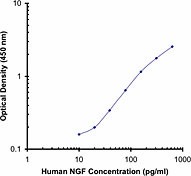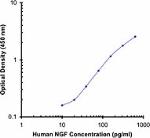- Clone
- JKhNGF-2 (See other available formats)
- Regulatory Status
- RUO
- Other Names
- Nerve growth factor, NGF, β-NGF
- Isotype
- Mouse IgG1

| Cat # | Size | Price | Quantity Check Availability | ||
|---|---|---|---|---|---|
| 509801 | 50 µg | $118.00 | |||
| 509802 | 500 µg | $417.00 | |||
Nerve growth factor (NGF) is a small secreted protein that is important for the growth, maintenance, and survival of certain target neurons (nerve cells). NGF consists of three types of subunits, α, β and γ, which specifically interact to form a 7S, 130,000 molecular weight complex. This complex contains two identical 118-amino acid β-chains, which are solely responsible for nerve growth stimulating activity of NGF. NGF is essential for the development and phenotypic maintenance of neurons in the peripheral nervous system (PNS) and for the functional integrity of cholinergic neurons in the central nervous system (CNS).
Product Details
- Verified Reactivity
- Human
- Reported Reactivity
- Mouse, Cow, Viper
- Antibody Type
- Monoclonal
- Host Species
- Mouse
- Immunogen
- recombinant human NGF (c-terminus)
- Formulation
- Phosphate-buffered solution, pH 7.2, containing 0.09% sodium azide.
- Preparation
- The antibody was purified by affinity chromatography, and conjugated with biotin under optimal conditions.
- Concentration
- 0.5 mg/ml
- Storage & Handling
- The antibody solution should be stored undiluted between 2°C and 8°C. Do not freeze.
- Application
-
ELISA Detection
- Recommended Usage
-
Each lot of this antibody is quality control tested by ELISA assay. For use as an ELISA detection antibody, a concentration range of 1 - 3 µg/ml is recommended. It is recommended that the reagent be titrated for optimal performance for each application. Additionally, BioLegend recommends the usage of Tris-Buffered Saline (TBS), pH = 7.2 for all washes and incubations, except substrate buffer. Do not use PBS as results may vary dramatically.
- Application Notes
-
ELISA Detection (mouse): The biotinylated JKhNGF-2 antibody is useful as the detecting antibody in a sandwich ELISA assay, when used in conjunction with the purified JKmNGF-1 antibody (Cat. No. 509702) as the capture antibody for detecting mouse NGF.
ELISA Detection (human): The biotinylated JKhNGF-2 antibody is useful as the detecting antibody in a sandwich ELISA assay, when used in conjunction with the purified JKhNGF-1 antibody (Cat. No. 509602) as the capture antibody for detecting human NGF. - RRID
-
AB_2152401 (BioLegend Cat. No. 509801)
AB_2152401 (BioLegend Cat. No. 509802)
Antigen Details
- Structure
- Kallikrein family of serine proteases; dimer; 13.5 kD (Mammalian)
- Bioactivity
- Enhances survival, growth, neurotransmitter biosynthesis of sympathetic, sensory neurons; neurotrophic factor; cutaneous innervation; growth, differentiation, survival B lymphocytes; possible role in allergy, tissue repair
- Cell Sources
- Hypothalamus, pituitary, thyroid gland, testes, epididymis, vascular smooth muscle cells, fibroblasts, mast cells, eosinophils
- Cell Targets
- Neurons, B cells, mast cells, eosinophils
- Receptors
- Low-affinity NGF receptor (LNGFR, p75 LNGFR, fast NGF receptor); high-affinity NGF receptor (trkA)
- Molecular Family
- Cytokines/Chemokines, Growth Factors
- Antigen References
-
1. Fitzgerald K, et al. Eds. 2001. The Cytokine FactsBook. Academic Press San Diego.
2. Levi A, et al. 1991. Annu. Rev. Pharmacol. Toxicol. 31:205.
3. Varon S, et al. 1991. Adv. Exp. Med. Biol. 296:267.
4. Micera A, et al. 2003. Cytokine Growth Factor Rev. 14:369. - Regulation
- Upregulated by glutamate, vitamin D3, IL-6, FGF-basic, astrocyte-specific IL-1, TNF-α, PDGF, TGF-β; downregulated by GABAergic neuronal activity, glucocorticoids, Schwann cell-specific TGF-β
- Gene ID
- 18049 View all products for this Gene ID 4803 View all products for this Gene ID
- UniProt
- View information about NGF on UniProt.org
Other Formats
View All NGF Reagents Request Custom Conjugation| Description | Clone | Applications |
|---|---|---|
| Biotin anti-mouse/human NGF | JKhNGF-2 | ELISA Detection |
Compare Data Across All Formats
This data display is provided for general comparisons between formats.
Your actual data may vary due to variations in samples, target cells, instruments and their settings, staining conditions, and other factors.
If you need assistance with selecting the best format contact our expert technical support team.


